2018仁爱英语九年级期末复习纲要
2018仁爱英语九年级期末复习纲要

九年级上期末复习纲要--- 英语考试时间:1 月底一、考试知识点梳理及典型例题:考点一:现在完成时的概念应用1. 结构:①肯定句:主语+have/has+动词的过去分词(done)+其他注意:have/has在该结构中是助动词,无实际含义,相应的句型转换使用have/has来变化②否定句:主语+haven't/hasn't+动词的过去分词(done)+其他③一般疑问句:Have/Has +主语+动词的过去分词(done)+其他?④特殊疑问句:特殊疑问词+have/has+主语+动词的过去分词(done)+其他?2. 概念:(1)现在完成时表示过去发生的某一动作对现在造成的影响或结果(多从上下文,语义上判断有无影响,一般无时间状语)。
(2)表示从过去开始一直延续到现在的动作或状态。
(常与表示从过去到现在的一段时间的状语,如fo叶时间段;since+过去时间点/一般过去时的句子;since+时间段+ago连用)【注意】have/has gone to, have/has been t不能与表示一段时间的状语连用,而have/has been to 可以。
3. 标志词:fo叶时间段;since+过去时间点/ 一般过去时的句子;since+时间段+ago ;yet/already/ever/ never/before;these day 等做题技巧:找标志词和通过定义判断与动词与现在有无关系,翻译要准确(注意延续非延续动词,非延续性动词不能与表示一段时间的状语连用,见考点三)典型例题:1. Wow! You ____ dinner! Let's eat now. (2017年河北省中考题)A. cookB. are cookingC. will cookD. have cooked2. Our foreign teacher, Andy, _____ English since 2001(. 2017 年邯郸一模)A. has taughtB. is teachingC. will teachD. teaches3. Li Hong has _____ the army for two years(. 2016 年保定一模)A. joinedB. be inC. bee n inD. joi ned in考点二::before, just, never, everalready, yet常用于现在完成时,用法如下:注意:still仍;’还” still不用于现在完成时中典型例题:( )1.This is the most beautiful park I have _______ visited.A.everB.stillC.n everD.bee n( )2. —Have you found your lost book ___ ?—No, I haven ' t.A.alreadyB.yetC.stillD.once( )3. —Have you clea ned your room __ ?—Yes, I ' ve _____ cleaned it.A. already, alreadyB.yet, yetC.already, yetD.yet, already( )4 —Have you heard from him ______ ?—Yes, I have. I ' ve __________ h eard from月考题)A. yet; alreadyB. already; yetC. yet; just nowD. still; ever考点三:考查si nee和for用在现在完成时中的用法。
九年级仁爱英语复习教案
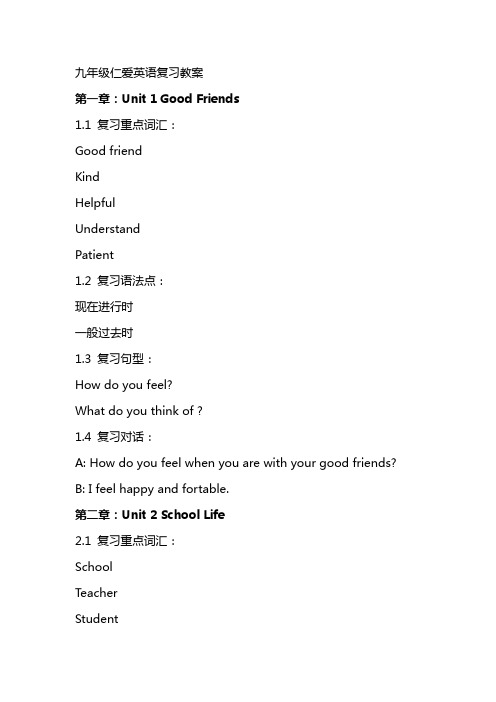
九年级仁爱英语复习教案第一章:Unit 1 Good Friends1.1 复习重点词汇:Good friendKindHelpfulUnderstandPatient1.2 复习语法点:现在进行时一般过去时1.3 复习句型:How do you feel?What do you think of ?1.4 复习对话:A: How do you feel when you are with your good friends? B: I feel happy and fortable.第二章:Unit 2 School Life2.1 复习重点词汇:SchoolTeacherStudentClassroomHomework2.2 复习语法点:一般现在时一般过去时2.3 复习句型:What does he/she look like?What does he/she do?2.4 复习对话:A: What does your teacher look like? B: My teacher is tall and thin.第三章:Unit 3 Colors3.1 复习重点词汇:ColorRedBlueGreenYellow3.2 复习语法点:一般现在时一般过去时3.3 复习句型:What color is it?I like3.4 复习对话:A: What color is your favorite? B: My favorite color is blue.第四章:Unit 4 Seasons4.1 复习重点词汇:SeasonSpringSummerAutumnWinter4.2 复习语法点:一般现在时一般过去时4.3 复习句型:What season is it?I like season.4.4 复习对话:A: What season is your favorite? B: My favorite season is spring. 第五章:Unit 5 FoodFoodRiceMeatVegetableFruit5.2 复习语法点:一般现在时一般过去时5.3 复习句型:What do you like to eat?Do you like?5.4 复习对话:A: What do you like to eat?B: I like to eat rice and vegetables. 第六章:Unit 6 Animals6.1 复习重点词汇:AnimalCatDogFishBird一般现在时一般过去时6.3 复习句型:What animal do you like? Does it like?6.4 复习对话:A: What animal do you like? B: I like dogs.第七章:Unit 7 Clothing 7.1 复习重点词汇:ClothingShirtPantsDressSkirt7.2 复习语法点:一般现在时一般过去时7.3 复习句型:What clothes do you like? What size do you wear?A: What clothes do you like? B: I like shirts and pants.第八章:Unit 8 Health8.1 复习重点词汇:HealthDoctorHospitalMedicineExercise8.2 复习语法点:一般现在时一般过去时8.3 复习句型:How are you?Do you need?8.4 复习对话:A: How are you?B: I'm fine, thank you.第九章:Unit 9 Travel9.1 复习重点词汇:TravelPlaceVisitTouristGuidebook9.2 复习语法点:一般现在时一般过去时9.3 复习句型:Where do you want to go?Do you want to?9.4 复习对话:A: Where do you want to go? B: I want to visit the Great Wall. 第十章:Unit 10 Nature10.1 复习重点词汇:NatureTreeFlowerSunMoon10.2 复习语法点:一般现在时一般过去时10.3 复习句型:What do you like about nature? Does it like?10.4 复习对话:A: What do you like about nature? B: I like the beautiful flowers and trees. 第十一章:Unit 11 Science11.1 复习重点词汇:ScienceExperimentTheoryScientistDiscovery11.2 复习语法点:一般现在时一般过去时11.3 复习句型:What is science?What discovery didmake?11.4 复习对话:A: What is science?B: Science is the study of the natural world. 第十二章:Unit 12 Technology12.1 复习重点词汇:TechnologyComputerInternetMobile phoneInvention12.2 复习语法点:一般现在时一般过去时12.3 复习句型:What technology do you like?How does technology affect?12.4 复习对话:A: What technology do you like?B: I like smartphones and the internet.第十三章:Unit 13 Environment13.1 复习重点词汇:EnvironmentPollutionRecyclingNatureConservation13.2 复习语法点:一般现在时一般过去时13.3 复习句型:What is the environment?How can we protect?13.4 复习对话:A: What is the environment?B: The environment is everything around us. 第十四章:Unit 14 Culture14.1 复习重点词汇:CultureTraditionFestivalArtLanguage14.2 复习语法点:一般现在时一般过去时14.3 复习句型:What is culture?What is your favorite?14.4 复习对话:A: What is culture?B: Culture is the way of life for a group of people.第十五章:Unit 15 Self-study15.1 复习重点词汇:Self-studyHabitSkillImprovementGoal15.2 复习语法点:一般现在时一般过去时15.3 复习句型:What is self-study?How can we improve?15.4 复习对话:A: What is self-study?B: Self-study is studying yourself to achieve your goals. 重点和难点解析重点词汇:每个章节中出现的重点词汇,如“good friend”、“school life”、“colors”、“seasons”、“food”等。
九年级下册英语复习提纲(仁爱版)

九年级下册英语复习提纲(仁爱版)找出它们之间的不同冠词的用法.现以冠词为例:1.John wasgiven _______ orange bag for his birthday but ______ bag waslost just now. A.an,a B.a,the C.the,a D.an,the2.There's________ old tree near _______ house. A.a,an B.an,the C.a,the D.the,a3.There is ___ 800-metre-long road behind ___hospital.A.an,an B.a,a C.an,the D.a,the4._______ good,kindgirl she is! A.How B.What a C.What D.How a5.________ bad weather!I hope it won't last long. A.How B.What C.What a D.How a6._______ they are listening to the teacher!A.How carefulB.What carefulC.How carefullyD.What carefully由上例题我们可以发觉冠词和感叹句是必考内容。
同样,象宾语从句的语序、代词的格、主谓语一致、动词和介词的搭配、近义词的比较以及习惯表达法和情态动词的使用等,无一不在考核之列。
所有这一切语言基础知识,我都将通过对典型试题的解题分析,展开讨论,分层展现难易对照,系统归纳。
对于语言基础知识是这样处理,那么对以能力测试为主要目的的中考其他试题情势又该怎么办呢? 这里我们以一篇完形填空题为例:A poor farmer had never left his small village.After he(1) a lot of money,he decided to spend a holiday in an expensivehotel(旅社)in a bigtown.(2)lunch time came on his first day there,he went to eat in the restaurant(餐馆)of the hotel(3)his new clothes.The head waiter(服务员)(4)him to thetable,took his order and went away.When he turned and (5)the farmer again,he had a (6)!The farmer had tied(系)his tablecloth round his (7).The head waiter told another waiter to goto the farmer and (8) him that people (9) do such a thing inhis restaurant.So the waiter went tothe farmer and said in a (10) voice(声音),"Good morning,sir.Would you like a haircut?"1.A.lent B.made C.paid D.gave2.A.During B.ThoughC.WhenD.Because3.A.for B.with C.on D.in 4.A.wanted B.putC.showedD.brought5.A.looked at B.watched C.saw D.found6.A.look B.rest C.table cloth D.surprise7.A.arm B.neck C.handD.head 8.A.ask B.tell C.taught D.told9.A.can't B.don't C.won't D.mustn't 10.A.friendly B.tired C.sad D.ter要求考生从所给的选项中选出正确答案,使补足后的短文意思通顺,结构完全。
仁爱版九年级英语知识点总结(K12教育文档)

仁爱版九年级英语知识点总结(word版可编辑修改)编辑整理:尊敬的读者朋友们:这里是精品文档编辑中心,本文档内容是由我和我的同事精心编辑整理后发布的,发布之前我们对文中内容进行仔细校对,但是难免会有疏漏的地方,但是任然希望(仁爱版九年级英语知识点总结(word版可编辑修改))的内容能够给您的工作和学习带来便利。
同时也真诚的希望收到您的建议和反馈,这将是我们进步的源泉,前进的动力。
本文可编辑可修改,如果觉得对您有帮助请收藏以便随时查阅,最后祝您生活愉快业绩进步,以下为仁爱版九年级英语知识点总结(word版可编辑修改)的全部内容。
Unit 1 The Changing WorldTopic 1 Our country has developed rapidly 。
A man got a telephone call from the doctor. The doctor said ,“About this medical test I did for you, I have some good news and some bad news 。
" So the man asked for the god news first. “The good news is that you have 24hours to live ”, said the doctor. “My god !” the man said incredulously , “ Is that the good news? Then what's the bad news?" The doctor said, “ The bad news is I couldn't reach you yesterday 。
”take place ___________ volunteer n. ____________ bell n 。
初三年级上册英语复习提纲仁爱版
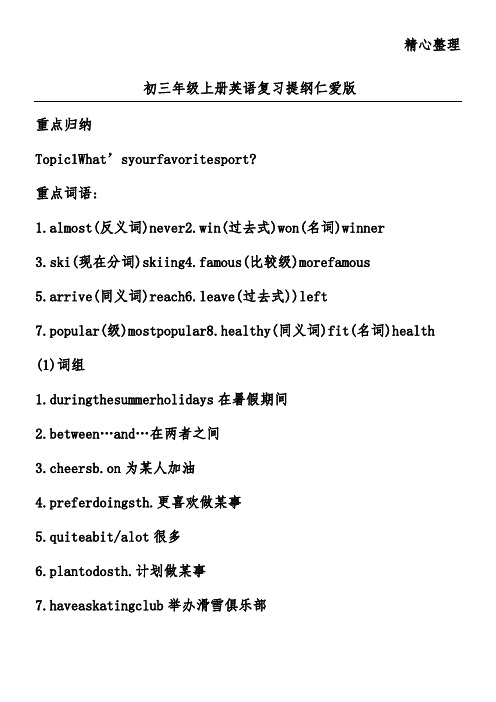
精心整理初三年级上册英语复习提纲仁爱版重点归纳Topic1What’syourfavoritesport?(1)5.quiteabit/alot 很多6.plantodosth.计划做某事7.haveaskatingclub 举办滑雪俱乐部8.goskating/skiing/bicycling/climbing/hiking去滑雪/滑冰/骑车/爬山/远足9.arrivein到达10.playagainst…与……对抗/较量22.agoodway一种好方法23.keepfit/healthy保持健康24.relaxoneself放松某人自己重点句型25.What’syourfavorites port?=Whatsportdoyoulikebest?你最喜爱的运动是什么?26.Whichsportdoyouprefer?=Whichsportdoyoulikebetter?你更喜欢什么运动?少花欢哪,常与seesb.doingsth.“看见某人正在做某事”强调动作正在进行.如:Isawyouplaybasketballalmosteverydayduringthesummerholida ys.Ioftenseehimdrawpicturesneartheriver.我常看见她在河边画画.Isawhergoacrossthestreet.我看见她过了马路Isawhergoingacrossthestreet.我看见她正在过马路.[类似的有watch,hear,feel等这类感观动词.]32.joinsb.表示“加入某人的行列”“和某人在一起”如如IarrivedattheGreatWall.=IgottotheGreatWall.=IreachedtheGrea tWall.注意:reachhere/there/home=gethere/there/home=arrivehere/there /home34.leave…离开……leavefor…动身去…/离开到…如:TheyareleavingBeijingtomorrow.明天他们要离开北京. TheyareleavingforJapanthedayaftertomorrow.后天他们要前往日本.如如7.begoodat(doing)sth.=dowellin(doing)sth.擅长于(做)某事如:Sheisgoodat(playing)baseball.=Shedoeswellin(playing)base ball.8.makesth/sb+adj.使某物(某人)在某种状态keep…sth/sb+adj.保持某物(某人)在某种状态如:Playingsoccercanmakeyourbodystrong. Swimmingcanhelptokeepyourheartandlungshealthy.重点语法了!(二)will+动词原形:表示单纯的将来事实,常与表将来的时间状语如:tomorrow,soon,later,nexttime(week/month/year…)等连用。
仁爱英语九年级上学期期末考试复习提纲(二)

初三上学期期末考试复习提纲(二)Unit 2 Topics 1 — 3Topic 1Grammer: Direct Speech and Indirect Speech直接引语间接引语直接引用或复述别人的话,被引用部分称为直接引语;用自己的话转述别人的话,被转述部分叫间接引语。
直接引语改为间接引语要注意以下几点变化:1.时态变2.指示代词地点状语和动词变3.人称变He said to us,”I will show you around the Great Wall tomorrow.”(变间接引语)He told us that he would show us around the Great Wall the next day.4.语序变①直接引语为陈述句,变成that引导的宾语从句,that可省。
He of ten says (that) China is great.→He often says(that)China is great.②直接引语为一般疑问句,一般变成以whether或if引导的宾语从句,用陈述句语序。
He says,”Is Tom an Englishman?”→He asks whether/if Tom is an Englishman.③陈直接引语为特殊疑问句,疑问词变为连接词,语序改为陈述句语序,问号变句号。
He asked,”Where is she going?”→He asked where she was going.5.祈使句改为间接引语:一改二变三加四去一改:said (to)改为told或asked /ordered二变:said to的宾语变为told /asked/ ordered等的宾语三加:在动词原形前加to或not to四去:去掉pleaseHe said to her,”Don’t take the book away,please.”→He asked her not to take the book away.Topic 2Grammer:Indef inite Pronouns不定代词不指明替代任何特定名词或形容词的代词叫做不定代词,在句中可做主语、表语和宾语。
仁爱版九年级下册总复习

复习unit5的短语和固定搭配:详细地感叹句位于值得做某事返回,回归把某物归还给某人与..链接作为..而闻名为..而知把…看作,认为..是各种各样的防御,防卫被..覆盖与…不同习惯于做某事在..领域在..岁时去世结束越来越…是..的骄傲为…感到骄傲为…感到骄傲死于积极参加建立推翻打垮讲学作报告彻底消灭成功做某事听说收到…的来信得知带某人参观某地…的象征扮演一个(积极、重要的)角色鼓励某人做某事看见某人做某事两者都…为了…为了纪念某人、某物依赖,依靠在…尽头传播,传开…复习unit6的短语和固定搭配:宁愿做……而不愿做……爱上某人用一种疲惫的声音高声(低声)说准备做某事并且,还有从前,很久以前突然袭击某人的某个部位注意某事被认为,被当做被用来做某事被用于(某方面)花费(时间、金钱)做某事对某人适合浪费时间在远处下定决心某人有可能做某事在某人看来保护……(远离)…..禁不住做某事把……变成……打某人的耳光打某人的脸打中某人的鼻子继续做某事一直不停地做某事隐瞒某事释放,解放迟早专心做某事坚持做某事赶上毕业于(某一学校)为做……准备首先如此……以致……很多在过去的(时间)在最后的(时间)祝愿某人成功希望某人做某事令某人高兴领某人惊奇展望未来实现某人的梦想在野外,在户外标志着……的结束结束保持联系准时,及时答应做某事,承诺做某事期待做某事使某物保持(状态)II. 单项选择。
(每小题1分,共20分)从A、B、C、D四个选项中选出可以填入空白处的最佳答案,16. He is ______ in our class.A. the second tallB. the second tallerC. second the tallestD. the second tallest17. I don‟t know the reason ______ he left here.A. whichB. whyC. whoD. when18. Henry ______ a short-story writer.A. known asB. was known asC. was know forD. was knowing to19. Jim‟s father died ______ heart trouble 2 days ago.A. inB. fromC. ofD. out20. In fact the Swede didn‟t understand the three questions ______ were asked in French.A. whereB. whoC. in whichD. which21. All ______ is needed is a supply of oil.A. the thingB. thatC. whatD. which22. —Tom hasn‟t visited Guangzhou.—______A. Neither she has.B. So has she.C. Nor has she.D. So she hasn‟t.23. That dinner was the most expensive meal we ______.A. would haveB. have hadC. had never hadD. had ever had24. Not only I but also Jane and Mary ______ tired of having one examination after another.A. isB. areC. amD. be25. — Does ______ of your parents enjoy watching TV, Kate?—______ of them do.A. both, BothB. every, BothC. all, AllD. either, Both26. The policeman promised me ______ the house.A. not enterB. to never enterC. not enteringD. never to enter27. A library with five thousand books ______ to the nation as a gift.A. is offeredB. has offeredC. are offeredD. have offered28. His parents wouldn‟t let him marry anyone ______ family was poor.A. of whomB. whomC. of whoseD. whose29. — How ______ will you be able to reach the top of the hill?—In ten minutes.A. longB. soonC. much timeD. fast30. ______ ask for more books unless you have finished these.A. PleaseB. Don‟tC. You‟d betterD. Rather than31. She‟d rather ______ the piano than the guitar.A. to playB. playingC. playedD. play32. We should ______ the children ______ X-ray.A. keep, away fromB. get, rid ofC. make, withD. give, for33. —The weather report says it‟s a fine day tomorrow, isn‟t it?—______A. No, I don‟t mind it.B. I‟m not so sure.C. I‟m afraid not.D. Yes, it does.34. Was it in this place ______ the last emperor died?A. thatB. in whichC. in whereD. which35. I finished my work ______ the help pf his classmates.A. withB. underC. onD. inIII. 完形填空。
九年级英语知识点总结仁爱版全册
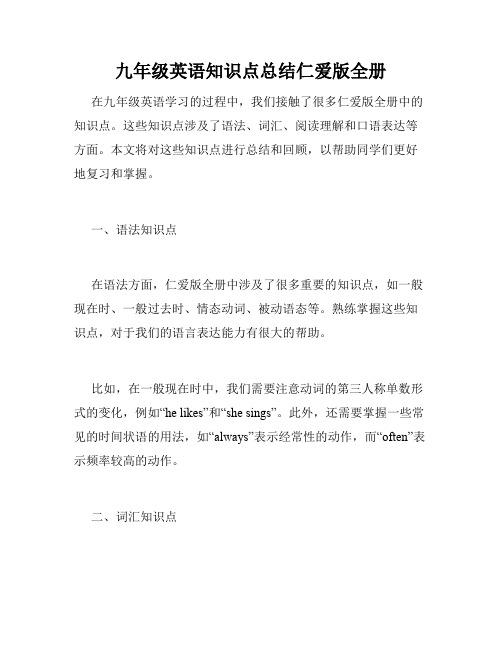
九年级英语知识点总结仁爱版全册在九年级英语学习的过程中,我们接触了很多仁爱版全册中的知识点。
这些知识点涉及了语法、词汇、阅读理解和口语表达等方面。
本文将对这些知识点进行总结和回顾,以帮助同学们更好地复习和掌握。
一、语法知识点在语法方面,仁爱版全册中涉及了很多重要的知识点,如一般现在时、一般过去时、情态动词、被动语态等。
熟练掌握这些知识点,对于我们的语言表达能力有很大的帮助。
比如,在一般现在时中,我们需要注意动词的第三人称单数形式的变化,例如“he likes”和“she sings”。
此外,还需要掌握一些常见的时间状语的用法,如“always”表示经常性的动作,而“often”表示频率较高的动作。
二、词汇知识点词汇是语言的基础,同时也是九年级英语学习的重点之一。
在仁爱版全册中,我们学习了很多高频词汇和常用短语,如各种动词、名词、形容词和副词等。
为了更好地掌握这些词汇,我们可以运用不同的学习方法。
比如,可以通过阅读英语文章来扩展词汇量,使用词汇卡片来记忆生词,并进行语境练习来巩固词汇的运用。
三、阅读理解知识点阅读理解是英语学习中必不可少的部分。
在仁爱版全册中,我们学习了不同类型的阅读材料,包括记叙文、说明文、议论文等。
通过阅读这些文章,我们可以提高自己的阅读理解能力,扩展词汇量,培养对语言和文章的理解能力。
在进行阅读理解时,我们需要注意文章的结构和主旨,同时也要留意作者表达的观点和态度。
通过对关键信息的提取和理解,我们可以更好地回答问题和完成相关的任务。
四、口语表达知识点口语表达是英语学习中一个重要的方面。
通过口语练习,我们可以提高自己的口语表达能力,提高听说能力和交流能力。
在仁爱版全册中,我们学习了很多与日常生活相关的话题,如家庭、学校、旅行等。
通过与同学们进行对话和小组讨论,我们可以锻炼自己的口语表达能力,提高听力理解能力,并学习如何运用合适的表达方式来表达自己的观点和意见。
总结而言,九年级英语知识点仁爱版全册的内容涵盖了语法、词汇、阅读理解和口语表达等方面。
仁爱九年级全册知识总结
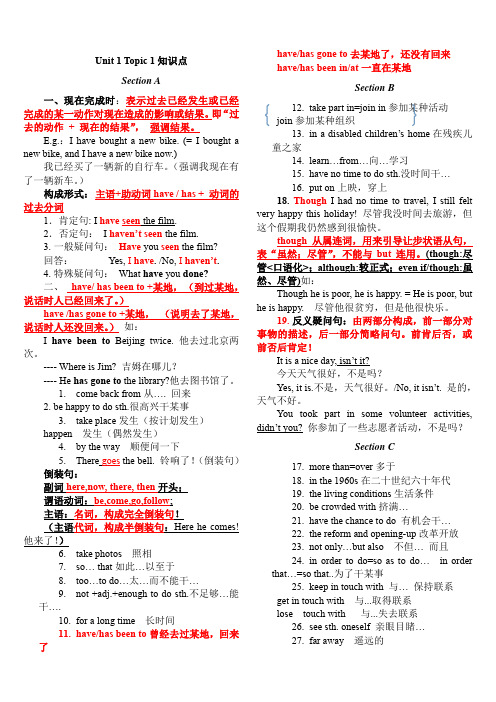
Unit 1 Topic 1知识点Section A一、现在完成时:表示过去已经发生或已经完成的某一动作对现在造成的影响或结果。
即“过去的动作+ 现在的结果”,强调结果。
E.g.:I have bought a new bike. (= I bought a new bike, and I have a new bike now.)我已经买了一辆新的自行车。
(强调我现在有了一辆新车。
)构成形式:主语+助动词have / has + 动词的过去分词1.肯定句: I have seen the film.2.否定句:I haven’t seen the film.3.一般疑问句:Have you seen the film?回答:Yes, I have. /No, I haven’t.4.特殊疑问句:What have you done?二、have/ has been to +某地,(到过某地,说话时人已经回来了。
)have /has gone to +某地,(说明去了某地,说话时人还没回来。
)如:I have been to Beijing twice. 他去过北京两次。
---- Where is Jim? 吉姆在哪儿?---- He has gone to the library?他去图书馆了。
e back from从…. 回来2. be happy to do sth.很高兴干某事3.take place发生(按计划发生)happen 发生(偶然发生)4.by the way 顺便问一下5.There goes the bell. 铃响了!(倒装句)倒装句:副词here,now, there, then开头;谓语动词:be,come,go,follow;主语:名词,构成完全倒装句!(主语代词,构成半倒装句:Here he comes! 他来了!)6.take photos 照相7.so… that如此…以至于8.too…to do…太…而不能干…9.not +adj.+enough to do sth.不足够…能干….10.for a long time 长时间11.have/has been to曾经去过某地,回来了have/has gone to去某地了,还没有回来have/has been in/at一直在某地Section B12.take part in=join in参加某种活动join参加某种组织13.in a disabled children’s home在残疾儿童之家14.learn…from…向…学习15.have no time to do sth.没时间干…16.put on上映,穿上18. Though I had no time to travel, I still felt very happy this holiday! 尽管我没时间去旅游,但这个假期我仍然感到很愉快。
完整仁爱英语九年级下知识点复习,文档
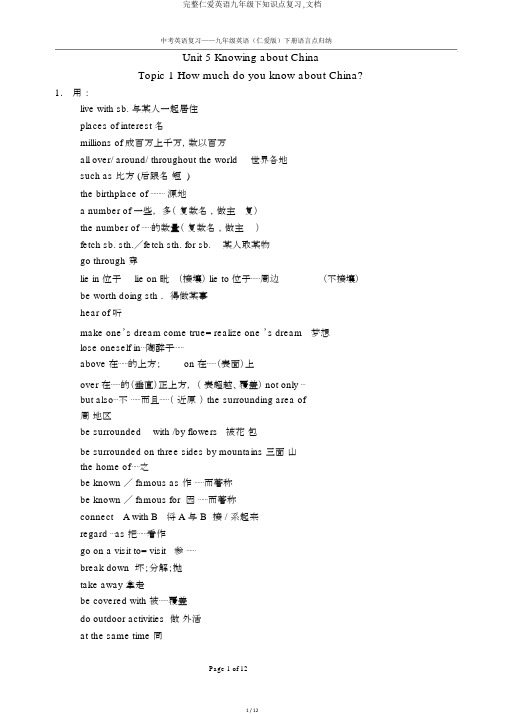
Unit 5 Knowing about ChinaTopic 1 How much do you know about China? 1.用:live with sb. 与某人一起居住places of interest 名millions of 成百万上千万,数以百万all over/ around/ throughout the world世界各地such as 比方 (后跟名短 )the birthplace of ⋯⋯⋯源地a number of 一些,多(复数名,做主复)the number of ⋯⋯的数量(复数名,做主)fetch sb. sth./fetch sth. for sb.某人取某物go through 穿lie in 位于lie on 毗(接壤) lie to 位于⋯⋯周边(不接壤)be worth doing sth .得做某事hear of 听make one’s dream come true= realize one ’s dream 梦想lose oneself in⋯陶醉于⋯⋯above 在⋯⋯的上方;on 在⋯⋯(表面)上over 在⋯⋯的(垂直)正上方,(表超越、覆盖) not only ⋯but also⋯不⋯⋯而且⋯⋯(近原) the surrounding area of周地区be surrounded with /by flowers被花包be surrounded on three sides by mountains 三面山the home of⋯⋯之be known / famous as 作⋯⋯而著称be known / famous for 因⋯⋯而著称connect A with B将A与B接/系起来regard ⋯as 把⋯⋯看作go on a visit to= visit参⋯⋯break down 坏;分解;抛take away 拿走be covered with 被⋯⋯覆盖do outdoor activities 做外活at the same time 同2.重点句型:(1) It ’s two years since Mr. and Mrs. Green came to China.= Mr. and Mrs. Green have been in China for two years,(1)They're the birthplaces of Chinese culture .她是中国文化的源地(2)⋯, I can fetch you Guide to China .It ’s a book which introduces China in detail.(3)Tibet is in the southwest of China ,isn't it?(4)⋯they are well worth visiting .(5)That ’s the most fantastic place that I have ever heard of .(6)The scenery is so attractive that visitors often lose themselves in it .(7)Hong Kong is known as the Oriental Pearl and Shopping Heaven .(8)People's way of life in the north is quite different from that in the south .(9)⋯, but people in the south travel not only by land but also by water .Topic 2 I ’m becoming more and more interested in China ’s history1.用:in the field/ area of在⋯⋯域learn from sb .向某人学at the age of 在⋯⋯年in one's thirties 在某人三十几be proud of 以⋯⋯傲,⋯⋯而傲take pride in 以⋯⋯傲,⋯⋯而傲be the pride of 是⋯⋯的傲die of 死于⋯⋯死于疾病、衰老等内因如癌症、心病等die from 死于事故等外因如,地震等search the Internet 上网找寻search +某地 +for sth.搜某地找某物as soon as⋯⋯就⋯⋯take an active part in极参加set up 建立,立bring down 推翻pass away 去世;消失be full of 充⋯⋯give a lecture 演;achieve the victory of 获取⋯⋯的利wipe out 底消,全部摧succeed in doing 成功做⋯⋯2.重点句型:(1)He was a great thinker who had many wise ideas and thoughts about nature and human behavior .(2)He spent the rest of his life t eaching and writing .(3)⋯the Chinese people are proud of .(4)It's hard to believe!(5)When he was in his thirties,he took an active part in the battle against the Qing dynasty .(6)Unfortunately ,Sun Yat-sen broke down from hard work and passed away full of regrets on March 12th. 1925 .(7)⋯, the Red Army succeeded in arriving in Gansu Province in 1936 .(8)Confucius Was a great man whose sayings are still very famous .3.重点辨析: spend,cost, take 和 pay 都能够表示“花”,但用法却不尽相同。
仁爱英语九年级下知识点复习(K12教育文档)
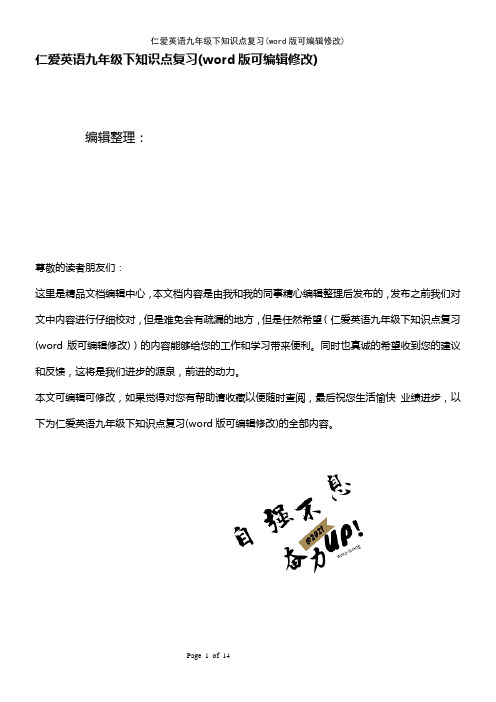
仁爱英语九年级下知识点复习(word版可编辑修改)编辑整理:尊敬的读者朋友们:这里是精品文档编辑中心,本文档内容是由我和我的同事精心编辑整理后发布的,发布之前我们对文中内容进行仔细校对,但是难免会有疏漏的地方,但是任然希望(仁爱英语九年级下知识点复习(word版可编辑修改))的内容能够给您的工作和学习带来便利。
同时也真诚的希望收到您的建议和反馈,这将是我们进步的源泉,前进的动力。
本文可编辑可修改,如果觉得对您有帮助请收藏以便随时查阅,最后祝您生活愉快业绩进步,以下为仁爱英语九年级下知识点复习(word版可编辑修改)的全部内容。
Unit 5 Knowing about ChinaTopic 1 How much do you know about China?1.习惯用语:●live with sb。
与某人一起居住●places of interest名胜●millions of成百万上千万,数以百万计●all over/ around/ throughout the world世界各地●such as例如(后跟名词短语)●the birthplace of………发源地● a number of一些,许多(饰复数名词,做主语时谓复)●the number of……的数量(饰复数名词,做主语时谓单)●fetch sb. sth./fetch sth. for sb. 给某人取某物●go through穿过●lie in位于 lie on 毗邻(接壤)lie to 位于……附近(不接壤)●be worth doing sth.值得做某事●hear of听说●make one's dream come true= realize one’s dream实现梦想●lose oneself in…沉浸于……●above在……的上方; on 在……(表面)上●over在……的(垂直)正上方,(还表跨越、覆盖)●not only…but also…不仅……而且……(领近原则)●the surrounding area of周边地区●be surrounded with /by flowers被花朵包围●be surrounded on three sides by mountains三面环山●the home of……之乡●be known/famous as 作为……而著称●be known/famous for 因为……而著称●connect A with B 将A与B连接/联系起来●regard…as 把……看作●go on a visit to= visit 参观……●break down损坏;分解;抛锚●take away拿走●be covered with被……覆盖●do outdoor activities做户外活动●at the same time同时2.重点句型:(1)It’s two years since Mr。
仁爱版本初中九年级的下册的总总结复习
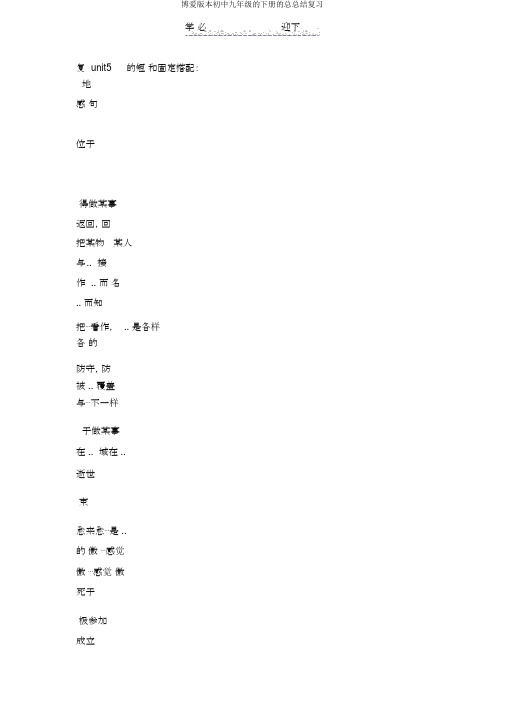
学必迎下复 unit5的短和固定搭配:地感句位于得做某事返回,回把某物某人与.. 接作 .. 而名.. 而知把⋯看作, .. 是各样各的防守,防被 .. 覆盖与⋯不一样于做某事在 .. 域在 ..逝世束愈来愈⋯是 ..的傲⋯感觉傲⋯感觉傲死于极参加成立颠覆打学作告底消成功做某事听收到⋯的来信得悉某人参某地⋯的象征饰演一个(极、重要的)角色鼓舞某人做某事看某人做某事二者都⋯了⋯了念某人、某物依,依赖在⋯尽播,开⋯复 unit6的短和固定搭配:情愿做⋯⋯而不肯做⋯⋯上某人用一种疲的声音大声(低声)准做某事而且,有以前,好久以前忽然某人的某个部位注意某事被,被当成被用来做某事被用于(某方面)花(、金)做某事某人合适浪在下定信心某人有可能做某事在某人看来保⋯⋯(离)⋯ ..忍不住做某事把⋯⋯成⋯⋯打某人的耳光打某人的打中某人的鼻子做某事向来不断地做某事某事放,解放早心做某事持做某事追上于(某一学校)做⋯⋯准第一这样⋯⋯致使⋯⋯好多在去的()在最后的()祝福某人成功希望某人做某事令某人高某人诧异展望将来某人的梦想在野外,在外志着⋯⋯的束束保持系准,及答做某事,承做某事期望做某事使某物保持(状)II.。
(每小 1 分,共 20 分 )从 A 、B、C、 D 四个中出能够填入空白的最正确答案,16. He is ______ in our class.A. the second tallB. the second tallerC. second the tallestD. the second tallest17. I don ’ t know the reason ______ he left here.A. whichB. whyC. whoD. when18. Henry ______ a short-story writer.A. known asB. was known asC. was know forD. was knowing to19. Jim ’ s father died ______ heart trouble 2 days ago.A. inB. fromC. ofD. out20.In fact the Swede didn ’understand the three questions ______ were asked in French.A. whereB. whoC. in whichD. which21. All ______ is needed is a supply of oil.A. the thingB. thatC. whatD. which22. — Tom hasn’ t visited Guangzhou.— ______A. Neither she has.B. So has she.C. Nor has she.D. So she hasn’ t.23. That dinner was the most expensive meal we ______.A. would haveB. have hadC. had never hadD. had ever had24.Not only I but also Jane and Mary ______ tired of having one examination after another.A. isB. areC. amD. be25. — Does ______ of your parents enjoy watching TV, Kate?— ______ of them do.A. both, BothB. every, BothC. all, AllD. either, Both26. The policeman promised me ______ the house.A. not enterB. to never enterC. not enteringD. never to enter27. A library with five thousand books ______ to the nation as a gift.A. is offeredB. has offeredC. are offeredD. have offered28. His parents wouldn ’ t let him marry anyone ______ family was poor.A. of whomB. whomC. of whoseD. whose29. — How ______ will you be able to reach the top of the hill?— In ten minutes.A. longB. soonC. much timeD. fast30. ______ ask for more books unless you have finished these.A. PleaseB. Don ’tC. You ’ d betterD. Rather than31. She ’ d rather ______ the piano than the guitar.博爱版本初中九年级的下册的总总结复习A. to playB. playingC. playedD. play32. We should ______ the children ______ X-ray.A. keep, away fromB. get, rid ofC. make, withD. give, for33. — The weather report says it ’ s a fine day tomorrow, isn ’ t it?— ______A. No, I don ’ t mind itB.. I ’ m not so sure.C. I ’ m afraid not.D. Yes, itdoes.34. Was it in this place ______ the last emperor died?A. thatB. in whichC. in whereD. which35. I finished my work ______ the help pf his classmates.A. withB. underC. onD. inIII.完形填空。
2016年仁爱版九年级Unit1-2单元复习提纲及练习
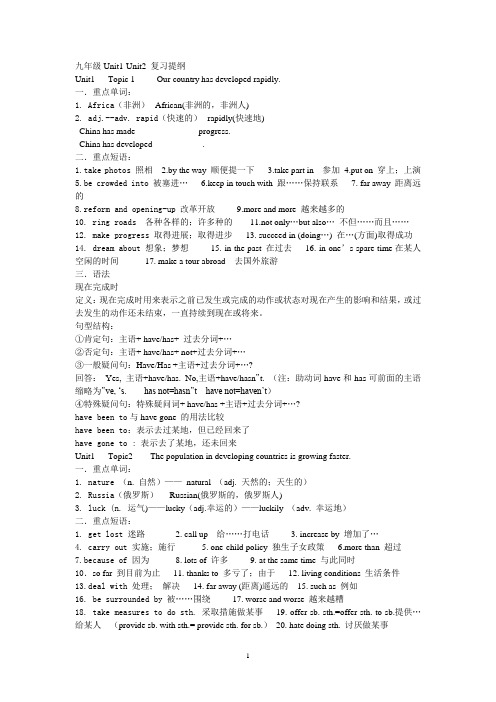
九年级Unit1-Unit2 复习提纲Unit1 Topic 1 Our country has developed rapidly.一.重点单词:1. Africa(非洲)--African(非洲的,非洲人)2. adj.--adv. rapid(快速的)--rapidly(快速地)China has made ____________ progress.China has developed ___________.二.重点短语:1.take photos 照相2.by the way 顺便提一下3.take part in 参加4.put on 穿上;上演5.be crowded into 被塞进…6.keep in touch with 跟……保持联系7. far away 距离远的8.reform and opening-up 改革开放9.more and more 越来越多的10. ring roads 各种各样的;许多种的11.not only…but also…不但……而且……12. make progress 取得进展;取得进步13. succeed in (doing…) 在…(方面)取得成功14. dream about 想象;梦想15. in the past 在过去16. in one’s spare time在某人空闲的时间17. make a tour abroad 去国外旅游三.语法现在完成时定义:现在完成时用来表示之前已发生或完成的动作或状态对现在产生的影响和结果,或过去发生的动作还未结束,一直持续到现在或将来。
句型结构:①肯定句:主语+ have/has+ 过去分词+…②否定句:主语+ have/has+ not+过去分词+…③一般疑问句:Have/Has +主语+过去分词+…?回答:Yes, 主语+have/has. No,主语+have/hasn‟t. (注:助动词have和has可前面的主语缩略为‟ve, ‘s. has not=hasn‟t have not=haven’t)④特殊疑问句:特殊疑问词+ have/has +主语+过去分词+…?have been to与have gone 的用法比较have been to:表示去过某地,但已经回来了have gone to : 表示去了某地,还未回来Unit1 Topic2 The population in developing countries is growing faster.一.重点单词:1. nature (n. 自然)——natural (adj. 天然的;天生的)2. Russia(俄罗斯)----Russian(俄罗斯的,俄罗斯人)3. luck (n. 运气)——lucky(adj.幸运的)——luckily (adv. 幸运地)二.重点短语:1. get lost 迷路2. call up 给……打电话3. increase by 增加了…4. carry out 实施;施行5. one-child policy 独生子女政策6.more than 超过7.because of 因为8. lots of 许多9. at the same time 与此同时10.so far 到目前为止11. thanks to 多亏了;由于12. living conditions 生活条件13.deal with 处理;解决14. far away (距离)遥远的15. such as 例如16. be surrounded by 被……围绕17. worse and worse 越来越糟18. take measures to do sth. 采取措施做某事19. offer sb. sth.=offer sth. to sb.提供…给某人(provide sb. with sth.= provide sth. for sb.)20. hate doing sth. 讨厌做某事21. So it is.的确如此。
九上仁爱版英语期末复习知识点总结

九上期末考试复习提纲一、重点单词1. develop v.发展→development n.发展→developed adj.发达的→developing adj.发展中的2. rapid adj. 快速的→ rapidly adv. 快速地(动副结构)3. abroad 国外hardly 几乎不respect尊敬discover 发现produce产生disturb打扰reduce 减少behavior 行为punish 惩罚Destroy 破坏thirsty 口渴浪费waste工业,产业industry create鼓励encourage guide 向导4. succeed v. 成功→ success n.成功successful →successfully adv. 成功地(动副结构,be+形容词,have/has+done)5. communicate v. 交流→ communication n.通讯;交流6. satisfy v.使满意→satisfied adj. 满意的7. medical adj. 医疗的→ medicine n.药8. 包括include9. recent adj. 近来的→ recently adv. 最近(动副结构)10. German→复数Germans11. luck n 运气→lucky adj. 幸运的→luckily adv. 幸运地12. nod点头→nodded (过去式) nodding (现在分词)13. 增加v. increase14. 到达,达到arrive15. control v. 控制→controlling (现在分词)→controlled (过去式/过去分词)16. difficult adj. 困难的→difficulty n. 困难→difficulties(pl.)17. home n. 家→homeless adj. 无家的→homelessness n. 无家可归18. 当地的19. steal v.偷→stole (过去式)→stolen (过去分词)20. important adj.重要的→ importance n.重要性the importance of ...的重要性21. pollution n. 污染→ pollute v. 污染22. breathe v. 呼吸→ breath n.一次吸入的空气;呼吸23. rise上升→ 过去式rose → 过去分词risen24. visit→ 参观者25.an excellent student26.different adj. 不同的→difference n. 差别(复数)27. agree v. 同意→agreement n.同意;一致→ disagreement n.不同意;不一致→disagree v.不同意28. protect v. 保护29. organize v.30. avoid v.避免(avoid doing sth.)31. escape v. 逃跑32. although/though conj.(连词) 虽然,尽管,即使33. none pron. 没有一个(表示三者或三者以上没有一个)→ all(反义词)34. hide hid(过去式)hidden(过去分词)二、重点短语1. so….that…. 如此….以至于典例:( )1). ---The film Tiny Times is interesting I would like to see it again.---Let’s go to the movies this weekend.A.so, thatB. such, thatC. too, to( )2). ---- Lucy, you look tired today. What’s wrong?----- I was ______ busy _____ I stayed up late last night.A. too, toB. such, thatC. so, that2. take place 发生3. have no time to do sth. 没有时间做某事4. put on 穿上;上演---put on funny shows 表演有趣的节目5. see sth. oneself 亲眼看见6. keep in touch with 与……保持联系7. far away 遥远8. be crowded into 挤在9. satisfy people’s needs 满足人们的需要10.make progress 取得进步11. succeed in doing sth. 成功地做了某事12. play an important part in 在….方面起重要作用13. in one’s spare/free time 在某人空闲时间14. go abroad 去国外15. with the development of 随着……的发展16.in the past 在过去17.living conditions 生活条件18.receive a good education 获得良好的教育19.medical care 医疗保健20.by the way 顺便问一下21.have a chance to do sth 有机会做某事22. have a population of 有….人口23. increase by/to 增加了/增加到典例()The population has increased more than seven million. It has increased 20%.A. to; toB. to; byC. by; to24. carry out 实行25.so far 到目前为止26. take measures to do sth.采取措施做某事27. be known / famous as 作为……而闻名28. work well in doing sth. 在做某事方面很有功效29.thanks to 幸亏;由于30. be surrounded by 被….所环绕31. discourage doing 阻止做某事32.what’s more 而且33.get lost=be lost 迷路34.one-child policy 独生子女政策35.supply sb. with sth.==supply sb to sth =provide sb.with sth.= provide sth for sb =offer sb. sth.=offer sth. to sb. 提供某人某物36.as a matter of fact =in fact 事实上,实际上lions of 数以百万计的\ hundreds of 数以百计的\ thousands of 成千上万38.decide on选定,选择\decide to do sth 决定做某事\ make a decision 做决定39. in need 在困难时,在贫困之中40.be\get used to (doing) sth 习惯于(做)某事→used to do sth 过去常常做某事()My brother _______ like collecting stamps. But now he _______collecting coins.A. used to, got used toB. got used to, used toC. used to, gets used to41.on purpose 故意地,有意地42.according to 据……所说,按……所报道43.live / have a normal life 过着正常的生活44.make a contribution to 为......作出贡献45.as a result 结果,因此46.encourage sb. to do sth. 鼓励某人做某事47.manage to do 设法做谋事48.think of...as... 把…看作三、知识点:1. There were so many people that I couldn’t find a good place to take photos. 那里人太多了以至于我找不到一个好的地方拍照。
- 1、下载文档前请自行甄别文档内容的完整性,平台不提供额外的编辑、内容补充、找答案等附加服务。
- 2、"仅部分预览"的文档,不可在线预览部分如存在完整性等问题,可反馈申请退款(可完整预览的文档不适用该条件!)。
- 3、如文档侵犯您的权益,请联系客服反馈,我们会尽快为您处理(人工客服工作时间:9:00-18:30)。
2018仁爱英语九年级期末复习纲要九年级上期末复习纲要---英语考试时间:1月底一、考试知识点梳理及典型例题:考点一:现在完成时的概念应用1.结构:①肯定句:主语+have/has+动词的过去分词(done)+其他注意:have/has在该结构中是助动词,无实际含义,相应的句型转换使用have/has来变化②否定句:主语+haven’t/hasn’t+动词的过去分词(done)+其他③一般疑问句:Have/Has +主语+动词的过去分词(done)+其他?④特殊疑问句:特殊疑问词+have/has+主语+动词的过去分词(done)+其他?2.概念:(1)现在完成时表示过去发生的某一动作对现在造成的影响或结果(多从上下文,语义上判断有无影响,一般无时间状语)。
(2)表示从过去开始一直延续到现在的动作或状态。
(常与表示从过去到现在的一段时间的状语,如for+时间段;since+过去时间点/一般过去时的句子;since+时间段+ago连用)【注意】have/has gone to, have/has been to不能与表示一段时间的状语连用,而have/has been to可以。
3.标志词:for+时间段;since+过去时间点/一般过去时的句子;since+时间段+ago;yet/already/ever/never/before;these days等做题技巧:找标志词和通过定义判断与动词与现在有无关系,翻译要准确(注意延续非延续动词,非延续性动词不能与表示一段时间的状语连用,见考点三)典型例题:1. Wow! You ______dinner! Let’s eat now. (2017年河北省中考题)A. cookB. are cookingC. will cookD. have cooked2. Our foreign teacher, Andy, _______English since 2001.(2017年邯郸一模)A. has taughtB. is teachingC. will teachD. teaches3. Li Hong has_______ the army for two years.(2016年保定一模)A. joinedB. be inC. been inD. joined in考点二::before, just, never, ever, already, yet常用于现在完成时,用法如下:注意:still“仍,还”;still不用于现在完成时中。
典型例题:( )1.This is the most beautiful park I have _____ visited.A.everB.stillC.neverD.been( )2.—Have you found your lost book_____?—No, I haven’t.A.alreadyB.yetC.stillD.once( )3.—Have you cleaned your room_____?—Yes, I’ve_____cleaned it.A.already, alreadyB.yet, yetC.already, yetD.yet, already( )4 —Have you heard from him_______?—Yes, I have. I’ve_______ heard from him.(月考题)A. yet; alreadyB. already; yetC. yet; just nowD. still; ever考点三:考查since和for用在现在完成时中的用法。
现在完成时用法二:表示过去已经开始,持续到现在的动作或状态,也许还要继续下去。
常与for或since引导的时间状语连用。
这时必须使用延续性动词。
I’ve known Li Lei for three years.We’ve lived here since 2001.△注意:since和for的区别由于since和for引导的时间都是持续性的一段时间。
Since后接过去的一个时间点,也可以接“一段时间+ago”,还可以接从句。
而for后只接时间段。
注意:1.表示短暂性的动词在否定结构中可用现在完成时。
例:I haven’t bou ght anything for two months.2.表示短暂性的动词完成时态不能和表示一段时间的时间状语连用,但是可以把短暂动词变成延续动词。
eg:come-----be leave-----be away frombuy------have die------be deadbegin---be on borrow---keepclose------be closed fall ill-----be illcatch a cold----have a cold get to know---knowmarry----be married join-----be a member of\be inI have come to Beijing for half a year.(F) I have been in Beijing for half a year.(T)He has left home for over two weeks(F) He has been away from home for over two weeks(T)典型例题:( )1.—When did the Greens come to China?—They_____ China for seven years.A.have come toB.have been toC.have come inD.have been in ( )2. Hurry up! The play __________ for ten minutes.A. has begunB. had begunC. has been onD. began( )3.—How long has he_____from home?—For eight days.A.leftB.been awayC.be awayD.leave( )4. Li Hong has_______ the army for two years.(2016年保定一模)A. joinedB. be inC. been inD. joined in考点四:考查现在完成时与一般过去时的区别。
典型例题:( )1. —How long have you been in Beijing?—_____A.Five years ago.B.Since five years ago.C.For five years ago.D.Since five years.( )2.—Have you seen my brother?—Yes. I _____ him in the library five minutes ago.A.metB.have metC.meetD.have been met( )3.—_____ you _____ your homework yet?—Yes, I _____ it ten minutes ago.A.Did, do, finishedB.Have, done, have finishedC.Have, done, finishedD.Will, do, finish( ) 4. Wow! You ______dinner! Let’s eat now. (2017年河北省中考题)A. cookB. are cookingC. will cookD. have cooked( ) 5.Paula is pleased that she _______ her lost watch.(2015年河北省中考题)A. findsB. foundC. has foundD. will find( ) 6.Miss Zhang, the most beautiful teacher, ______many flowers and letters these days.(2012河北中考)A. receivedB. will receiveC. was receivingD. has received考点五:so引导的完全倒装句(Unit 1 Topic 2)结构:so + be/ 助动词/ 情态动词+主语表示“……也是一样”,意为“A如此,B也如此。
”He is an honest boy, and so am I. 他是一个诚实的男孩,我也是。
He saw the kites, and so did I. 他看见那些风筝了,我也看到了。
He has been to Beijing. So have I. 他去过北京,我也去过。
(现在完成时,其助动词是have/has)注意:此句型只用于肯定句。
否定句要用“neither/nor+ be/ 助动词/ 情态动词+主语”。
如:—He cant’t speak Russian. 他不会讲俄语。
—Neither / Nor can I. 我也不会讲俄语。
辨析:so+主语+be/ 助动词/ 情态动词此句型不是倒装句,只是单纯地重复前面一句的意思,表示“的确如此、就是这样”。
典型例题:( )1.—Have your parents been to Russia?—Yes. So _____ I.A.doB.have beenC.didD.have( )2.—I have never visited a paper factory.—_____A.So have I.B.So I have.C.Neither have I.D.I haven’t now.( )3.—David has made great progress recently.—_____, and _____.A.So he has, so you haveB.So he has, so have youC.So has he, so have youD.So has he, so you have考点六:考查分数的表达法,其结构是分子为基数词,分母为序数词,分子大于1时,分母加s。
分数+of+名词可数名词复数谓语动词用复数不可数名词谓语动词用单数典型例题:( )1.There are sixty teachers in our school._____ of them are women.A.Two thirdB.Two threesC.Two thirdsD.Second three( )2.In our class _____ of the students _____ girls.A.third fifths, isB.third fifth, areC.three fifth, isD.three fifths, are( )3. of land water.A.Two third, isB.Two thirds , areC.Two thirds , isD.Two thirds, was考点七:反意疑问句:结构:陈述句+简短问句?前肯定,后否定前否定,后肯定考查反意疑问句中简短问句部分的时态和人称的单复数要与陈述句部分一致。
